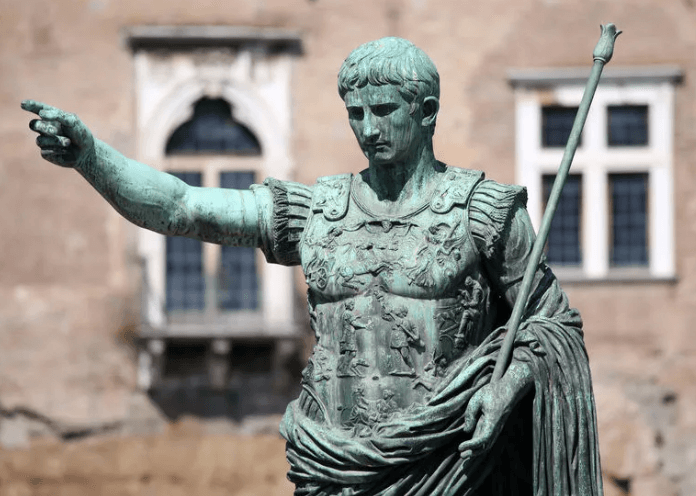The financial legacy of Augustus Caesar, Rome’s first emperor, is a fascinating subject that reveals the intricate mechanisms behind his vast wealth. His fortune, accumulated through military conquests and astute economic reforms, not only eclipsed that of prominent figures like Cleopatra and Julius Caesar but also transformed the Roman economy. By examining the sources of Augustus’s wealth and the strategies he employed, one can gain deeper insights into how his financial acumen influenced the empire’s stability. What specific actions did Augustus take that ensured both his personal prosperity and the enduring strength of Rome?
Sources of Augustus’s Wealth
Augustus Caesar’s wealth was primarily derived from a combination of land acquisitions, military conquests, and the establishment of a complex taxation system that effectively expanded the financial resources of the Roman Empire.
His military conquests not only secured territories but also enriched the state.
Concurrently, taxation reforms enhanced revenue collection, allowing Augustus to fund public projects, thus reinforcing his power and promoting civic stability.
See also: Vince Sant Net Worth: Fitness Model and Entrepreneur’s Earnings
Economic Climate of Rome
The economic climate of Rome during the reign of Augustus was characterized by significant reforms that transformed the financial landscape, fostering stability and growth in an empire previously plagued by civil strife and economic disarray.
Revisions in the Roman currency facilitated trade, while a restructured taxation system ensured equitable revenue collection. This enabled Augustus to fund public projects and maintain social order, ultimately enhancing citizen prosperity.
Key Financial Strategies
One of the pivotal financial strategies employed during Augustus Caesar’s reign was the implementation of a comprehensive taxation system that not only increased state revenues but also streamlined the collection process, thereby reducing corruption and enhancing administrative efficiency.
His financial acumen and investment strategies can be summarized as:
- Establishing fair tax rates.
- Promoting trade and commerce.
- Investing in public infrastructure.
Land and Property Holdings
During his reign, the acquisition and management of land and property became a cornerstone of economic stability and power consolidation, as these assets provided both financial returns and strategic advantages in governance.
Augustus implemented policies that facilitated extensive land acquisition, enhancing agricultural productivity.
Effective property management ensured the efficient use of resources, ultimately reinforcing his control and securing the loyalty of the Roman populace.
Influence of Trade and Commerce
The economic policies implemented by Augustus Caesar were pivotal in shaping the wealth of the Roman Empire, facilitating a surge in trade and commerce.
By establishing key trade routes, he not only enhanced the movement of goods but also stimulated economic interconnectivity across regions.
This strategic focus on commerce laid the groundwork for a prosperous economy, significantly contributing to his net worth and the overall financial health of the empire.
Economic Policies Impacting Wealth
Augustus Caesar’s economic policies significantly transformed the landscape of trade and commerce in the Roman Empire, fostering an environment that enhanced wealth accumulation and facilitated extensive commercial networks.
Key aspects of these policies included:
- Strategic taxation policies that optimized revenue without stifling trade.
- Wealth distribution initiatives aimed at reducing economic disparity.
- Support for infrastructure projects that bolstered connectivity and commerce.
These measures collectively promoted economic vitality.
Key Trade Routes Established
Building on the economic vitality fostered by Augustus Caesar’s policies, the establishment of key trade routes played a pivotal role in expanding the reach of commerce throughout the Roman Empire.
Notably, maritime trade thrived alongside the famed silk routes, facilitating the exchange of goods, culture, and ideas.
This interconnectedness not only enriched the empire’s economy but also fostered a sense of shared identity among diverse populations.
Comparison With Other Leaders
Comparing Augustus Caesar’s net worth to that of other historical leaders reveals significant insights into the economic power and resources available to different regimes during their respective periods.
An analysis of Augustus’s wealth comparison illustrates how:
- His wealth was largely derived from conquests.
- He managed state resources efficiently.
- His net worth dwarfed that of contemporaries like Cleopatra and Julius Caesar.
This leadership wealth analysis underscores Augustus’s unique position in history.
Legacy of Augustus’s Wealth
The legacy of Augustus Caesar’s wealth is multifaceted, encompassing significant economic reforms that transformed the Roman economy and enhanced state revenue.
His strategic accumulation of land and property not only solidified his personal wealth but also reinforced his political power and influence.
Furthermore, Augustus’s patronage of the arts fostered a cultural renaissance that left an indelible mark on Roman society, intertwining his financial legacy with the cultural advancement of the Empire.
Economic Reforms Impact
How did Augustus Caesar’s economic reforms fundamentally reshape the financial landscape of Rome and contribute to his enduring legacy of wealth? His initiatives fostered economic stability through effective taxation reforms, which enhanced revenue generation while minimizing corruption. This set the foundation for a prosperous empire, ensuring long-term financial health.
- Introduction of a fair tax system
- Standardization of currency
- Infrastructure investments
Land and Property Accumulation
Land and property accumulation during Augustus Caesar’s reign not only signified personal wealth but also served as a strategic tool for consolidating power and influence across the Roman Empire.
Through calculated land distribution policies and property taxes, Augustus enhanced state revenues while ensuring loyalty from landowners.
This effectively intertwined economic stability with political authority, thus solidifying his legacy and the empire’s prosperity.
Patronage of Arts
Patronage of the arts emerged as a significant element of Augustus Caesar’s legacy, reflecting both his immense wealth and strategic vision for cultural supremacy within the Roman Empire. His artistic patronage facilitated exceptional cultural investments that transformed Rome’s artistic landscape.
Augustus commissioned renowned poets like Virgil and Horace.
He funded monumental architectural projects, such as the Forum of Augustus.
Additionally, he supported the development of sculpture and painting, celebrating imperial ideals.
Conclusion
The wealth amassed by Augustus Caesar not only transformed his own status but also fundamentally shaped the economic landscape of the Roman Empire.
For instance, the establishment of the Pax Romana facilitated trade across vast territories, significantly increasing revenue through taxation and commerce.
This strategic economic framework ensured stability and prosperity, reinforcing Augustus’s legacy as a pivotal figure in Roman history.
The enduring impact of his financial strategies continues to be a subject of study in economic history and leadership analysis.




